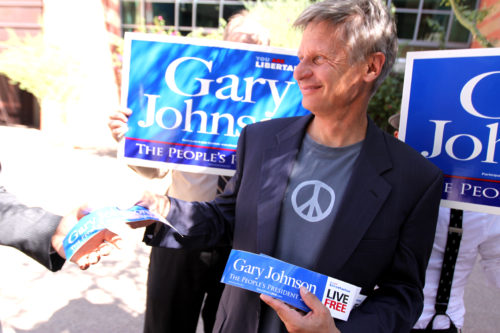[Karl E. H. Seigfried is one of our talented monthly columnists. On the fourth Saturday, he brings you insight and analysis about issues coming from within or affecting our collective communities. If you enjoy his work, consider donating to our fall fund drive today. You make it possible for The Wild Hunt to continue featuring great writers, unique voices, and news reports every day. Every dollar counts. Please donate today and share the campaign. Thank you.]

Heathens in Politics
Heathenry and politics have not always been happy bedfellows, yet there have been Heathens around the world who have campaigned for public office. Some have even won elections. The thumbnail portraits below feature four Heathens from four countries who have four very different stories of engagement with and disengagement from public life.
In Iceland, Liberal Party co-founder Sigurjón Þórðarson was elected in 2003 to represent the Northwest Constituency in the Alþgingi, the national assembly. The parliament was founded in 930, seventy years before the nation converted to Christianity. At the time of his election, Sigurjón was a goði (Heathen priest) in the Ásatrúarfélagið (Ásatrú Fellowship), the organization that began the modern revival of Old Norse religion in 1972. His election made him the first goði with a seat in the Alþgingi since the fourteenth century.

The Icelandic Alþingi [Photo Credit: Zinneke]
Ásatrú practitioner Anika Tanck (now Petersdorf) was a 2009 candidate for the state parliament of Schleswig-Holstein, a German state so far north that the first element of its name contains a Germanized form of –vík (Old Norse for “inlet”) and the second refers to one of the pagan Saxon tribes (Holcetae, from *Holtsāton, “inhabitant of the forest”). She ran as local leader of the Piratenpartei Deutschland (Pirate Party Germany), the German division of the international confederation known as Pirate Parties International. The party program is long and detailed, with an emphasis on protecting freedoms in the wake of the digital revolution.
In the light of current U.S. media criticism of the Green presidential candidate as someone who serves as a spoiler for the Democratic one by peeling away millennial voters, it’s interesting that German newspaper Der Spiegel used similar rhetoric against Tanck and her Pirate colleagues, “The entry into the state parliament is unlikely. But the Pirate Party competing will at least cost the Greens important votes. Typical Pirate supporters include young people – an age group whose election turnout is chronically below average. Quite possibly, more otherwise apolitical people will go to vote.” Tanck won 2.2% of the vote, almost exactly the percentage Jill Stein receives in current polls. Seven years later, she told me, “I’m not anymore in politics. I now own a store for organic food.”

[Courtesy Photo]
I strongly believe that, if we as a faith wish to be taken seriously by society, we need to participate in society. If we want our worldview to be accepted, we need to incorporate it into society by taking a leadership role so that we can be understood and accepted.
He also emphasized the importance of representing Heathenry well as a public figure:
Because we are still on the fringes of society, those of us who choose to take on a leadership role must represent the best of what we have to offer society. We must show honesty, integrity and honor that is above reproach. If we do this solely to enrich ourselves or to preach an agenda of racial hatred, then we will destroy the credibility of all heathens in society for generations to come.
Unfortunately, the highest-profile Heathen in U.S. politics failed to live up to any part of this standard.
In 2009, Daniel Halloran was elected to the 19th City Council District in Queens, New York as a Tea Party Republican. A practitioner and leader of Theodism, Halloran became “the first openly elected heathen in the nation.” Despite his religion being widely known, he stressed his Roman Catholic upbringing during the campaign in an article for the Queens Chronicle called “I believe in God,” never once mentioning Theodism, Heathenry, or polytheism. The campaign of Kevin Kim, his Korean-American rival for the council seat, stated that political supporters of Halloran made racist statements to Kim’s followers. A Halloran volunteer publicly portrayed the election as “white faces” versus Koreans, and the Asian American Legal Defense and Education Fund stated that the contest was “marred by racial harassment and anti-Asian slurs.”
Two years later, Halloran appeared in a video documenting “The Ground Zero Mosque: The Second Wave of the 9/11 Attacks,” an event sponsored by a group calling itself Stop Islamization for America. He was lauded by the group’s supporters as “the only member of the City Council willing to speak out against the Ground Zero mosque.” In 2013, Halloran was arrested and charged with brokering a $200,000 attempt to bribe Republican county leaders and fix the race for mayor of New York City. Unluckily for Halloran, the multiple payoff meetings were held with an undercover FBI agent. Halloran remains incarcerated after his insanity defense and appeal for reversal of his ten-year prison sentence were rejected. The court stated, “We have considered all of Halloran’s remaining arguments, and find them without merit.”
Politicians and Heathens
Despite the relatively small size of the Pagan and Heathen communities, there have been two U.S. presidential candidates who have been willing to engage with practitioners.
In 2011, Republican presidential candidate Gary Johnson held a Google+ Hangout with journalists from the Hellenic, Hindu, Wiccan and Witch communities. The hosts of a Heathen podcast were invited to join, but declined to participate. The lack of any voice from the Heathen community is regrettable, as there seems to be a great interest from Heathens in Johnson’s current presidential run as a Libertarian.

Gary Johnson in 2012 [Photo Credit: Gage Skidmore]
In the Google+ Hangout, the questions relating to religion dealt with general Pagan and Wiccan issues, and Johnson seems to not have made any public statements directly relating to Heathenry. At the time of the 2012 election, there were issues that some segments of the Heathen community were definitely working on. The push to have the U.S. Department of Veterans Affairs approve Thor’s hammer a religious emblem allowed on government headstones was still underway; it was not approved until after the election, in 2013. The lack of Pagan chaplains in the U.S. military – a subject also of interest to Heathens – was brought up in the Hangout, but Johnson’s answer appears a bit confused in the transcript:
I guess I’m gonna be in the camp … why are there any chaplains in the military and if there are chaplains in the military why are there then not Rabbis in the military and I didn’t realize there was a Pagan chaplain but you can see that that’s obviously part of the equality equation here.
There have, in fact, been rabbis serving as military chaplains in the United States since Rabbi Jacob Frinkel was commissioned in 1862, and there is still no official chaplain of any type of Paganism in any branch of the U.S. military – although progress has recently been made.
The military situation is a bit different for Heathens than it is for other Pagans. Although Wicca has been recognized as “a nontraditional faith” by the U.S. Army Chaplain Corps since 1978, the status of Ásatrú and Heathen soldiers in the army remains in limbo. After seven years of soldiers, veterans, and allies working to have Ásatrú and Heathenry added to the U.S. Army’s religious preference list as a faith option for soldiers, the administration continues to delay making the change, despite a letter-writing campaign, a Heathen Resource Guide for Chaplains being submitted to the Department of Defense, and the announcement and retraction of the addition being approved.
The obstinate and years-long resistance of the U.S. Army was thrown into relief by the success of Master Sergeant (MSgt) Matt Walters, who simply made a formal request to the Air Force Chaplains Office and was quickly successful in having Ásatrú and Heathenry added to the Air Force’s religious preference list. Why the U.S. Army Chaplains Corp has been so determined to block the addition for its own branch of the military remains a mystery.
On September 9, the day after taking members of Thor’s Oak Kindred to see Dr. Jill Stein speak at her Chicago rally, I sat down for a one-on-one interview with the Green Party presidential candidate. This was the first time a presidential candidate spoke on the record with a Heathen journalist and made a public statement in support of equal religious rights for Heathens in the military. I had been attempting to get Stein to address this issue for a while, but had not had much luck getting directly to her via her social media accounts. When she came to town for her rally, I figured out the proper contact person and was immediately scheduled for a private interview.

Jill Stein in Chicago [Courtesy of The Norse Mythology Blog]
It’s really unfair, unjust, and undemocratic in this democracy that they are defending for their human rights not to be respected. I would strongly urge that all religions – whether they are Judeo-Christian or not – all religions should be given the seal of approval there, in order to sustain those people who have put their lives on the line for our country.
They deserve the benefits of real democracy, and real democracy means we do not discriminate according to religion, creed, race, ethnic background, or gender. Period.
Whatever the political allegiances of a given Heathen, this should be recognized as a positive moment. Given the many attempts and limited success of Heathens seeking to enter the political world as officeholders, it is a small step in the right direction to have a presidential candidate on the national stage acknowledge the issues facing Heathens and publicly draw attention to the need for discrimination to end.
I am under no illusion that Stein will power through to the White House, wave a seiðr staff, and make every Heathen’s personal wish list materialize in a powdery puff of sandalwood smoke. However, I do believe that each good action taken makes another connection in the web of wyrd, and – when there enough actions taken and connections made – change will come. Mounting public pressure may finally lead to official recognition of Heathenry by the U.S. Army. That recognition may lead to the appointment of Heathen chaplains. That appointment may lead to more acceptance of Heathens in other professions. That acceptance may lead to positive changes in your own life. Wyrd bið full āræd– wyrd is fully inexorable.
Note: The full text of the Jill Stein interview can be read at The Norse Mythology Blog.
* * *
The views and opinions expressed by our diverse panel of columnists and guest writers represent the many diverging perspectives held within the global Pagan, Heathen and polytheist communities, but do not necessarily reflect the views of The Wild Hunt Inc. or its management.
The Wild Hunt is not responsible for links to external content.
To join a conversation on this post:
Visit our The Wild Hunt subreddit! Point your favorite browser to https://www.reddit.com/r/The_Wild_Hunt_News/, then click “JOIN”. Make sure to click the bell, too, to be notified of new articles posted to our subreddit.

The author makes a issue of attribution on who the request to add Asatru and Heathen as religious preferences is currently waiting on action. The Department of Defense has assigned a working group of Chaplains to address the religious preference list. That DoD level working group is where the request is, and we understand that when they have completed their work Asatru and Heathen will be religious preference options for all service branches. – Josh Open Halls Project